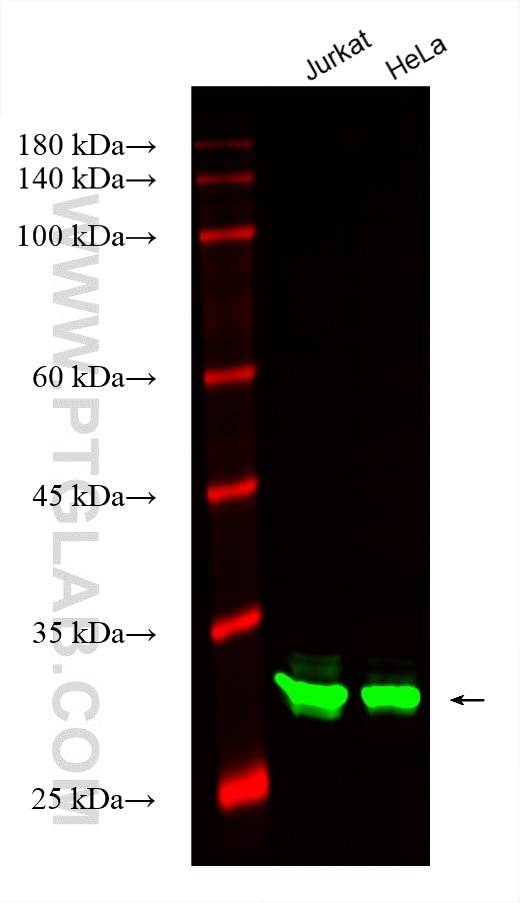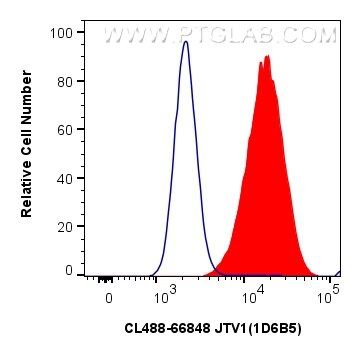Validation Data Gallery
Tested Applications
| Positive WB detected in | Jurkat cells, HeLa cells |
| Positive FC (Intra) detected in | HeLa cells |
Recommended dilution
| Application | Dilution |
|---|---|
| Western Blot (WB) | WB : 1:500-1:1000 |
| Flow Cytometry (FC) (INTRA) | FC (INTRA) : 0.80 ug per 10^6 cells in a 100 µl suspension |
| It is recommended that this reagent should be titrated in each testing system to obtain optimal results. | |
| Sample-dependent, Check data in validation data gallery. | |
Product Information
CL488-66848 targets JTV1 in WB, FC (Intra) applications and shows reactivity with human, mouse, rat samples.
| Tested Reactivity | human, mouse, rat |
| Host / Isotype | Mouse / IgG2b |
| Class | Monoclonal |
| Type | Antibody |
| Immunogen | JTV1 fusion protein Ag0675 相同性解析による交差性が予測される生物種 |
| Full Name | JTV1 gene |
| Calculated molecular weight | 36 kDa |
| Observed molecular weight | 32-36 kDa |
| GenBank accession number | BC002853 |
| Gene Symbol | JTV1 |
| Gene ID (NCBI) | 7965 |
| RRID | AB_3672926 |
| Conjugate | CoraLite® Plus 488 Fluorescent Dye |
| Excitation/Emission maxima wavelengths | 493 nm / 522 nm |
| Form | Liquid |
| Purification Method | Protein A purification |
| UNIPROT ID | Q13155 |
| Storage Buffer | PBS with 50% glycerol, 0.05% Proclin300, 0.5% BSA , pH 7.3 |
| Storage Conditions | Store at -20°C. Avoid exposure to light. Stable for one year after shipment. Aliquoting is unnecessary for -20oC storage. |
Background Information
JTV1, also named p38, AIMP2, was first knew as a factor associated with macromolecular protein complex, which consists several different aminoacyl-tRNA synthetases. JTV1 is a scaffold protein required for the assembly and stability of the multi-tRNA synthetase complex. JTV1 could act as a mediator of TGF-beta signaling and its functional importance in the control of MYC during lung differentiation. Blocks MDM2-mediated ubiquitination and degradation of p53/TP53. Functions as a proapoptotic factor.
Protocols
| Product Specific Protocols | |
|---|---|
| WB protocol for CL Plus 488 JTV1 antibody CL488-66848 | Download protocol |
| FC protocol for CL Plus 488 JTV1 antibody CL488-66848 | Download protocol |
| Standard Protocols | |
|---|---|
| Click here to view our Standard Protocols |

